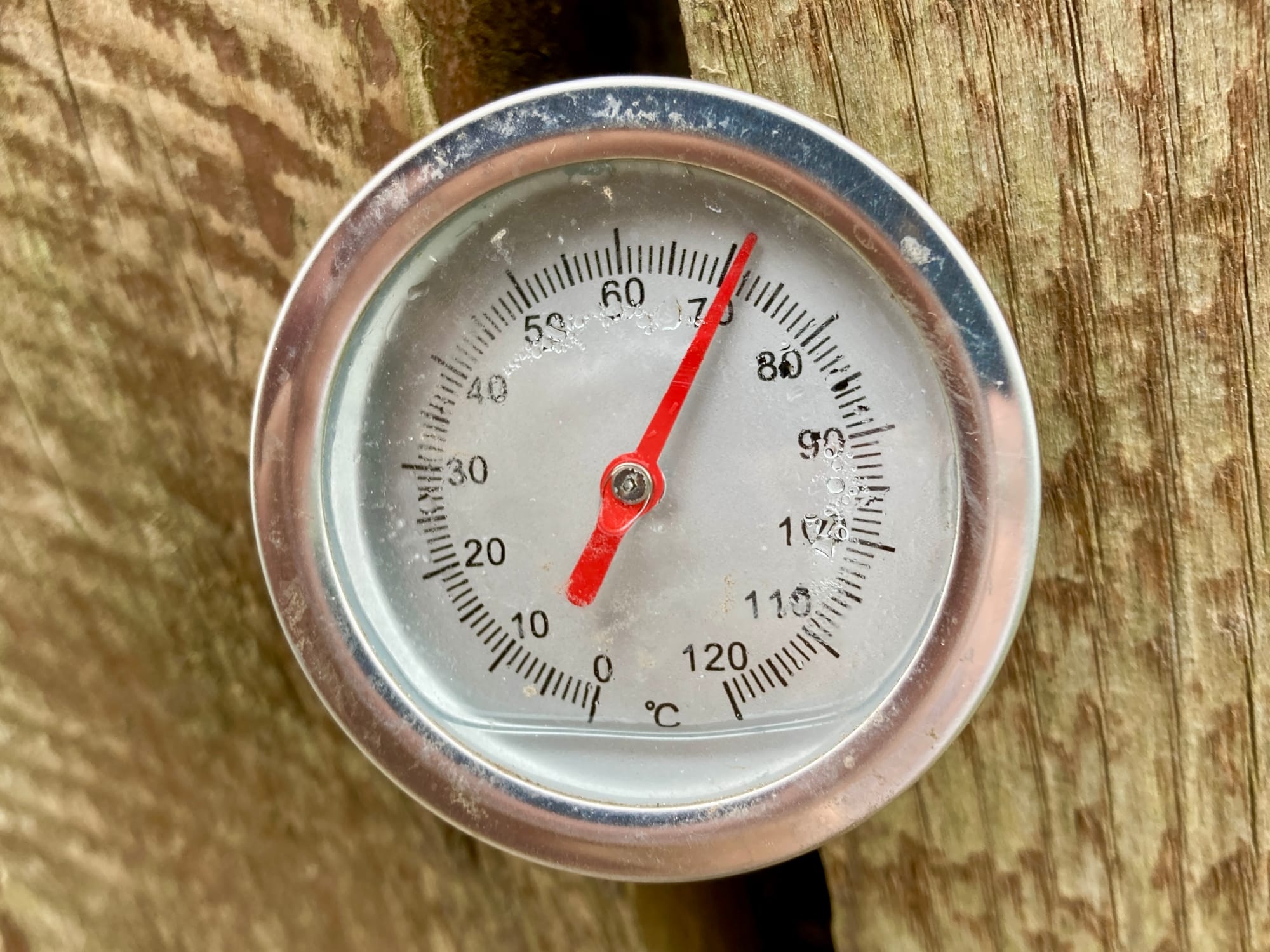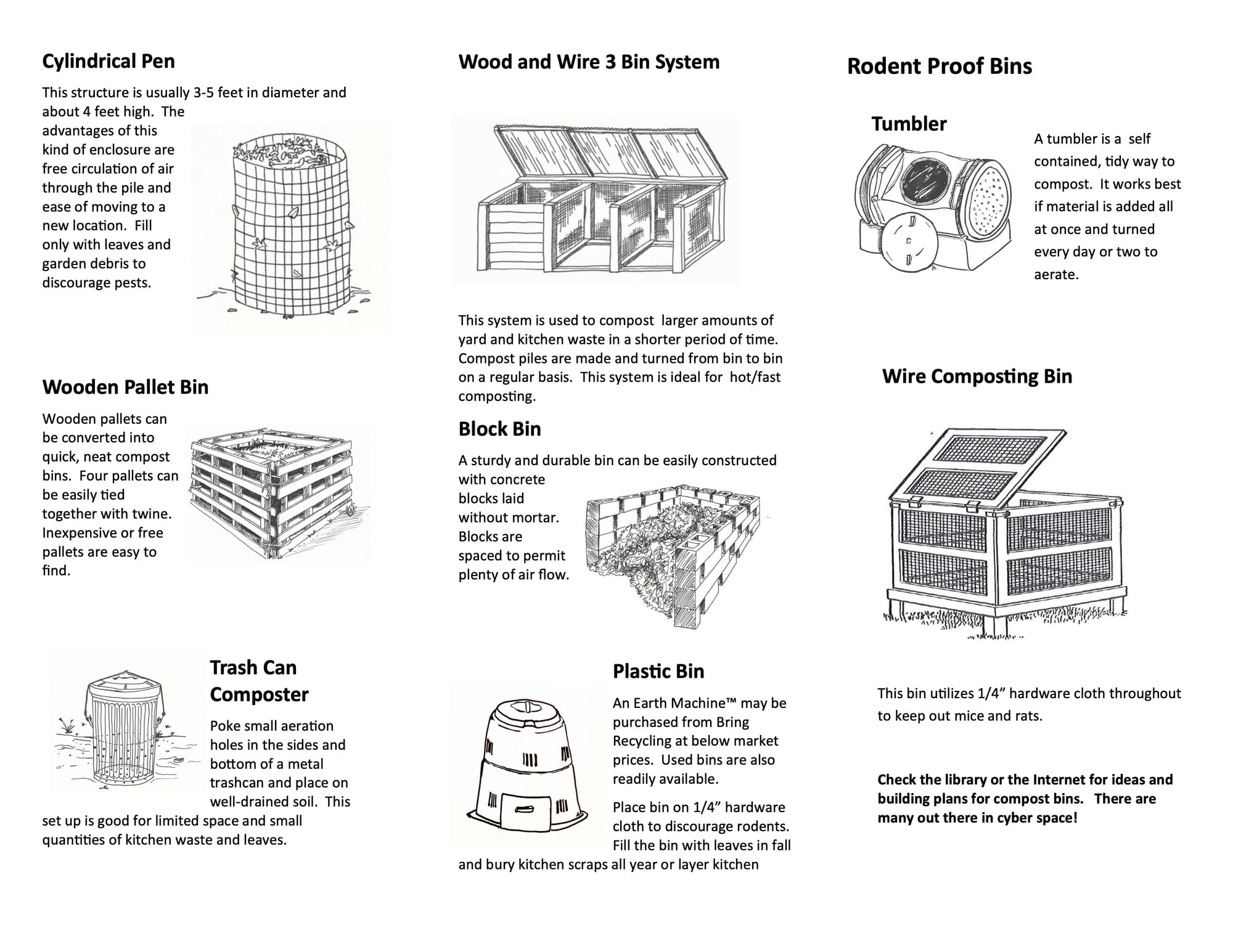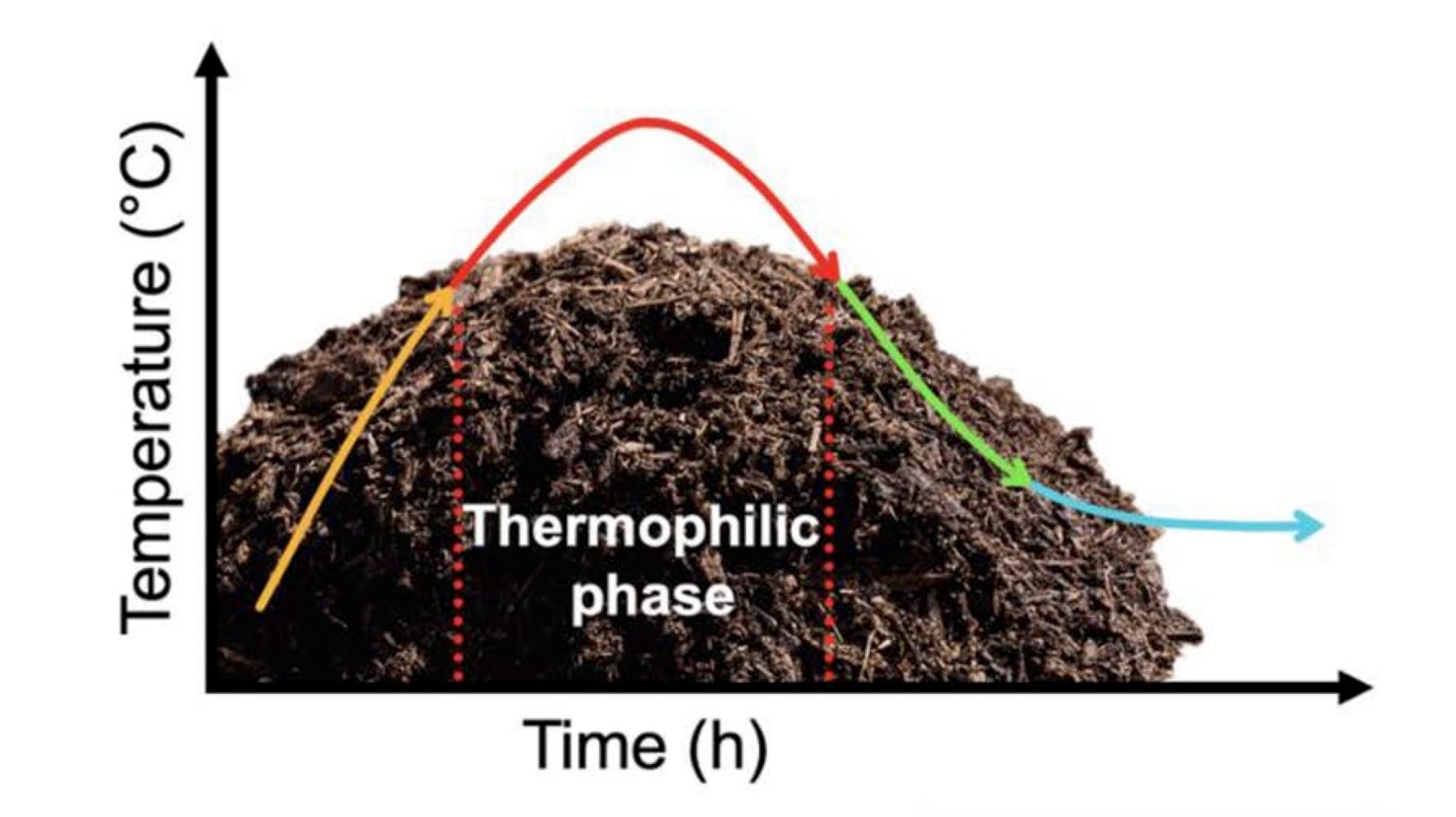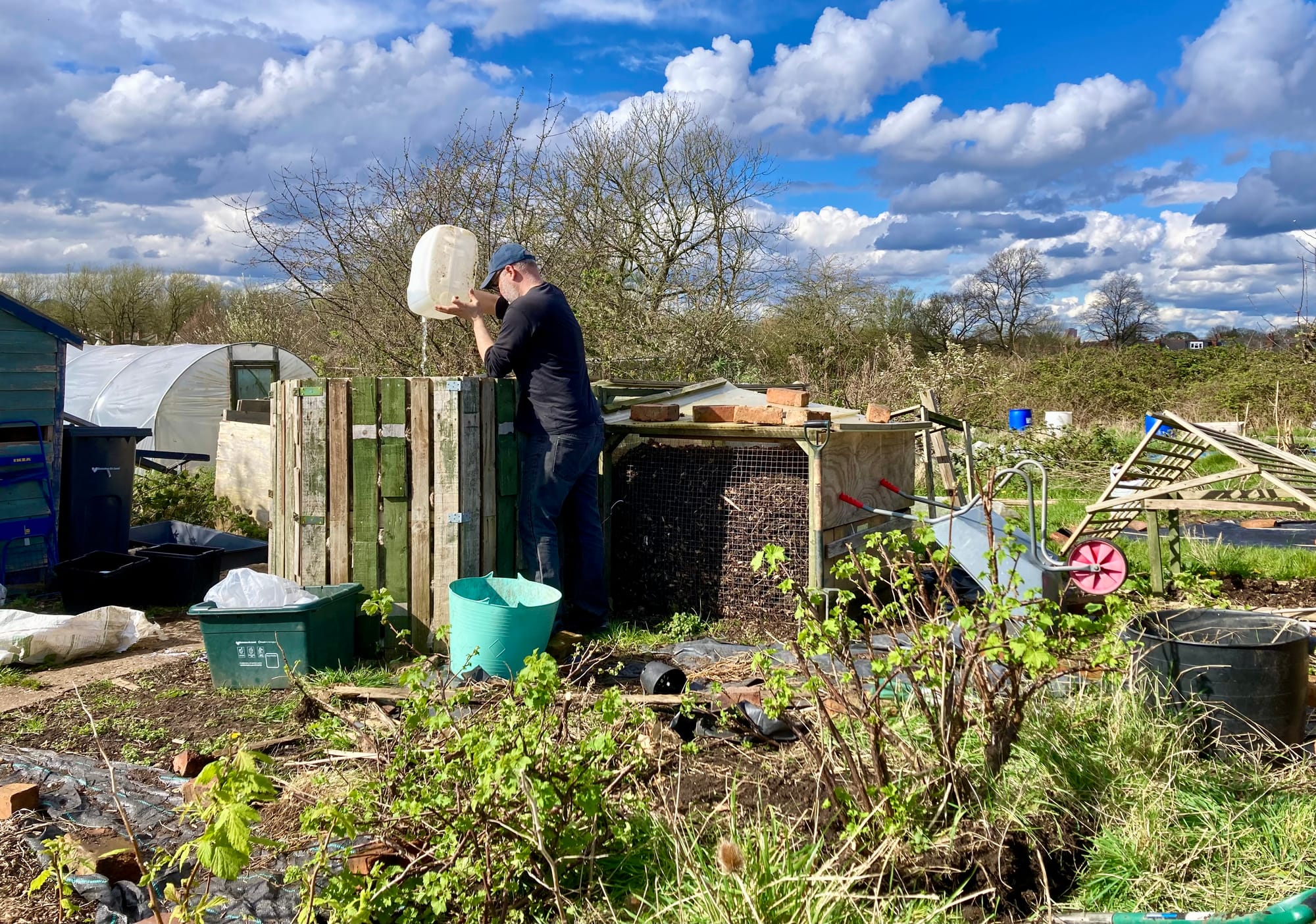The Aerobic Digest 12: Thermo-messo-whatnow?
In this issue, understanding the thermic phases, recording the sounds made by the bugs in the compost heap, and three songs about worms.

After a damp and cold spring my active heap finally went over 70 degrees this week. Hooray! The winter is finally over!
Some compost nerds warn against hitting high temperatures as it can burn out some nutrients, but I'm personally a fan of the super-hot heap, as long as you keep it moist. You can be sure you're killing off the weeds and diseases and it's a reassuring sign that you've got the mix right.
Plus this is only stage one. Once the thermophilic bacteria have exhausted their food and the temperatures get a little more reasonable there's plenty for the mesophilic dudes to do, not to mention the worms. I'd expect to see this sort of temperature for a couple of weeks after new inputs, or a full turn, and then it float between 30 and 50 degrees for a few months to really break things down. See below for a more scientific breakdown of the stages of composting.
Otherwise it's been steady as they go on the allotment with weekly topping up of the heap I started in the last issue, which might now be at capacity. If there's no significant reduction in height next week I'll cap it off and leave it until its full turnover in early June.
Speaking of turning, I made a video of my turning the currently resting heap. It was a long process so I've cut out some breaks and sped it up 20 times, and the battery ran out before the end, so it only runs for a couple of minutes.
Is this sort of thing interesting? Should I make more videos of the process?
This heap had been filled over three months, starting mid December with the final layer going in around mid March. The turn itself happened on April 10th, so the top material was pretty fresh. But from the middle to the bottom it was nice and dark and moist with loads of worms. And at high speed you can really see the bugs crawling around, desperate to get out of the light before the resident robins swoop in. This heap is alive.
I like to totally empty the bay onto the paving slabs in front and then re-fill it because it lets me see how things are going and then mix it all up properly. You'll hopefully see I'm spreading the heap around and as I fill it up again I'm aiming to put the really un-done material in the middle of the new heap. It's not a perfect process, but it works fairly well. It's been a month since this turn and I think it's probably ready to be turned again, this time into the neighbouring long-term resting bay.
The sound of composting
In 2013 I went on a guided walk around Edgbaston Reservoir run by SoundKitchen, a collective of sound artists, which I'm astonished to discover is still archived on their website a decade later. At strategic points in the walk we were invited to listen to field recordings made at that location with special equipment, revealing hidden worlds. One of them was a rotting log into which they'd placed some contact microphones which pick up tiny resonances in the wood. The result was an incredible recording of the nesting ants making a heck of a racket.
This has stuck with me ever since as something really special, like a microscope for the ears, but it only occurred to me this year that I could do the same with a compost heap. So I ordered some contact mics from ebay, plugged them into a recording device and plunged them into the heap.
The results are... sketchy? There was a lot of noise which I did my ignorant best to filter out (I am definitely not a sound artist), but there's definitely something there. Or not there, in one case. I put them in a video with photos of the heap I was recording.
The first recording is basically silent, which makes sense as it's the hot heap. Nothing bigger than a thermophilic microbe wants to be in here.
In the second recording you can really hear the worms moving around. Cool!
If I didn't know the third recording was of a drier heap with lots of wood-chewing insects I might assume it's the same as the worms, but it's not.
And the fourth one is the very much done pile. You can hear things moving but it's much less pronounced, like a faint echo.
On reflection I think I need to attach the mics to a wooden probe which the bugs will rub against to create a proper resonance. Just putting the mics in a plastic bag isn't really enough. But I do know that when the mics are held in mid air they're pretty much silent, so it's not just line noise.
More of this sort of thing to come I'm sure, and if you're local to me (Birmingham UK) and want to collaborate on doing something more advanced with recording the composting ecosystem, hit me up.
Oregon State University's composting resources
The OSU Extension Service is the community outreach department of Oregon State University and they mostly focus on improving health through food production. To this end they've put loads of gardening and farming resources online, and a decent amount of them are about composting and soil health. It's a mother-lode of rigorously sourced information tailored for the general audience. Just the sort of thing I like to feature here!
Start with Do The Rot Thing, a guide all the different composting systems and methods which is both comprehensive and concise, and comes with an even more concise PDF to print out.

And then, golly, I don't know! There's so much good stuff and it all looks like deeply sensible, aimed at all levels of interest and ability. If you're plotting any kind of community composting programme you would do well to take what's been done here as inspiration.
Thermo-messo-whatnow?
Whenever I write about the bacteria in a hot composting heap I always have to check my terminology and while working on the opening section of this newsletter I came across this really good explainer of what's going on.

It's an academic article, so gets pretty deep into the details, but don't let that put you off. The introduction is written in a very accessible way and it cleared up a few things I wasn't fully sure about. I think this bit is the best explainer I've seen of the stages of composting (edited for style):
A generic composting process is characterized by four main phases [...].
The first phase is the mesophilic or initial phase, where a rapid increase of temperature in the range 10–42 °C determines the start of the degradation of organic matter, and its duration varies between 24 and 72 h.
The second one is the thermophilic phase, characterized by temperatures between 45 and 70 °C in relation to the metabolic activities of endogenous thermophilic microorganisms which degrade the organic compounds, and it can last from several days to several weeks. The temperature can remain fixed for many days according to the properties of the feedstocks, the size of the composting plant and the environment.
During the following phase, indicated as the mesophilic II or maturation phase, the temperature decreases between 65 and 50 °C, and it maintains itself for 1–2 months, with the reactivation of mesophilic microorganism and the degradations of the most recalcitrant components. These first three phases can also be referred as the bio-oxidative period of composting.
Finally, the last phase is the maturing or curing phase, which can last for 1–4 months with temperature comprised between 50 and 23 °C, and where the organic matter produced stabilizes.
Mesophilic II is the title of my next doom metal album.
Three songs about worms
That'll do for this issue. I think these are going to be monthly for a while so expect the next one around the start of June, though who knows, I might have more to share sooner!
If you have any questions about composting that I could answer in a future issue, please send them along. It's always good to have a writing prompt. And I'm always up for interesting links to share here.
Email to info@aerobicdigest.email or @ me on Mastodon or Bluesky where I keep tabs on the various #compost tags.
Your friend in rotting vegetable matter,
Pete Ashton
